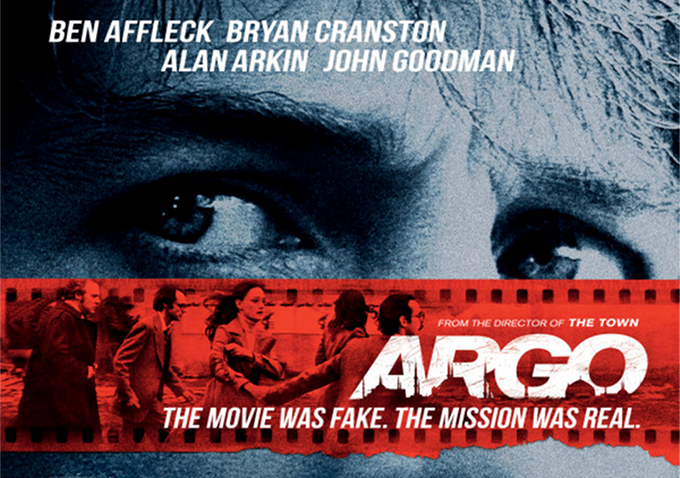If a big theme with this year’s Best Picture nominees was a lack of tension and challenge, Argo is the clear outlier. Like Lincoln and Zero Dark Thirty, Argo was saddled with a story where the ending was never in doubt. Yet Ben Affleck managed to take that story and develop an engrossing, all-purpose thriller with some meaningful commentaries on the stress of human existence. It would be poetic justice, and just plain just, for Argo to win Best Picture in a year when so many movies failed to deliver. It was the best good movie in a year that had no great movies (or at least, none were nominated).
Argo tells one of those stories that we know must be true because no scriptwriter would be dumb enough to invent it (we’ll call it the Catch Me if You Can genre). Americans are taken hostage in Iran. A few escape to the Canadian embassy. The CIA wants to get them out. They do this by inventing a fake movie studio to market a fake movie, allowing CIA agents to pretend that the Americans are Canadian movie producers scouting locations for a science-fiction bonanza called Argo.
The first important quality of this kind of movie is to make the danger seem real. This is harder than it seems. We know they escape in the end. Moreover, how can we empathize with characters who are living relatively benign daily lives, hiding in the Canadian ambassador’s home? This is accomplished mostly through a technique that almost all of Hollywood has forgotten, but that, thankfully, Ben Affleck has not: less is more.
The difficulty of living in the Canadian ambassador’s home is not dependent on ominous, earth-shattering events. The difficulty is that each and every moment is dangerous. There is never any relief. There is never any going outside. Loud music would be dangerous. The housekeeper may or may not understand what is going on. Argo does not waste its time on exploitative, contrived terrors. When the doorbell rings, the doorbell just rings. It is frightening not because strange or horrifying things continually occur. It is frightening because ordinary things have become horrifying.
Conversely, CIA Agent Mendes’ plan to rescue the hostages works because it is outlandish, brazen, and absurd. Since we know it is going to succeed, the film needs to take a plan that is patently absurd but successful in retrospect, and make the viewers realize how patently absurd it would have seemed at the time. Argo accomplishes this by focusing on people, instead of outcomes. We recognize the plan is silly because we recognize the discomfort of presenting such a plan to your superior—who hasn’t had to tell their boss the bad news?
Finally, when the plan is put into action, Affleck continues the theme of less is more, building the tension, and deferring the payoff. It’s only in the last five minutes of the movie that we finally have a chase scene—and even then, it is a chase between police cars and an airplane.
Fittingly enough, this chase scene has been highly criticized. “It didn’t happen” is the main claim. True enough. A simple Google search will reveal that no police cars chased the plane as it was taking off. But this misses the point. Documentaries are meant to deliver an exact account of an historical sequence of events. Films “based on” true events are meant to deliver something else. That “something else” is what Argo captures and what Lincoln and Zero Dark Thirty mostly miss. The viewer is not literally experiencing the events; the director’s job is to deliver the experience. I can’t know what it must feel like to be on the plane to freedom, still on the taxiway, so close to salvation, staring at the front of the plane, silently pleading with God that no Iranian soldiers appear before the plane takes off. A film’s job is to make me experience at least a little of that tension. If it takes police cars chasing the airplane down the runway, then that’s what it takes. Criticize if you find the climax ineffective, but don’t criticize simply because it is not literal truth. We already know the movie is not literal truth. Special Agent Mendes was not Ben Affleck. Victor Garber has never and probably never will be a Canadian ambassador.
Yet in transcribing real events into a coherent, organically-developed narrative, without dull exposition, we get at least a window into a thrilling story. This is what movies do. To fail to tell a story is to fail at making a movie. Lincoln and Zero Dark Thirty, in trying so hard to stick to a narrative, fail to tell a compelling story. Argo isn’t as concerned with points A and B—they’ll be just fine, making money selling themselves to abstract hypotheticals everywhere. It’s more concerned with engaging its audience. Unsurprisingly, a good story follows.













